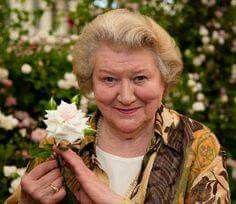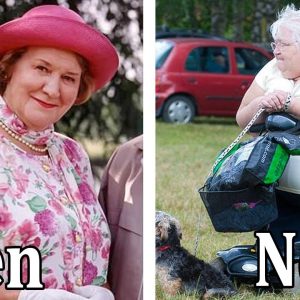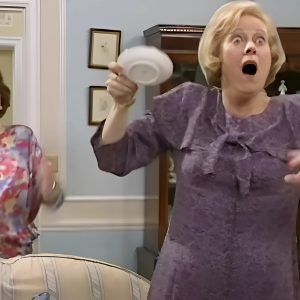“The Grande Dame of Delusion: Hyacinth Bucket’s Reign in Keeping Up Appearances”
In the world of British sitcom royalty, few characters have courted as much chaos—and as many chuckles—as Hyacinth Bucket. Or rather, Bouquet, as she insists with unfaltering pretension and the precise articulation of someone who clearly practices in the mirror each morning.
Patricia Routledge’s portrayal of the status-obsessed, socially anxious, and perpetually embarrassing matriarch in Keeping Up Appearances is nothing short of iconic. A masterclass in comedic timing and character delusion, Hyacinth is a tour de force of repressed ambition, exaggerated manners, and maddening interference. She may have never truly ascended the social ladder, but in the annals of television, she reigns supreme.
A Legend of the Lawn: The Woman Behind the White Gloves
Set in the English Midlands, Keeping Up Appearances follows Hyacinth’s desperate attempts to transcend her modest origins and insert herself among the upper crust. The show’s genius lies in the juxtaposition of her lofty ambitions with the dismal reality: her husband Richard, a retired civil servant barely clinging to sanity; her chaotic family, led by slob extraordinaire Onslow and flirtatious sister Rose; and a neighborhood that practically flees at the sight of her.

Hyacinth isn’t just a woman with aspirations—she’s a self-declared Grande Dame, orchestrating elaborate “candlelight suppers,” issuing formal invitations for “riparian entertainments,” and answering her phone with the now-famous, “The Bouquet residence, the lady of the house speaking.” With every syllable, she seeks to conjure aristocratic illusions around her humble suburban home. And woe betide the poor soul who refers to her as “Mrs. Bucket.”
But beneath the comic bravado and mispronounced French lies a character as complex as she is infuriating.
A Jerk with a Juxtaposition: The Woman Everyone Dreads—And Pities
Hyacinth is a paradox—simultaneously the protagonist and the villain of her own story. She is the dreaded neighbor, the pushy parishioner, the nightmare dinner guest, and the unrelenting socialite. Few sitcom characters are as universally avoided, even by their own family. Postmen hide, vicars duck into hedges, and the long-suffering Elizabeth drops china from sheer proximity to Hyacinth’s presence.
Yet, she is not heartless. For all her pretentious declarations and social engineering, Hyacinth loves deeply—if misguidedly. Her affection for her wayward son Sheridan (who might only call to ask for money or announce a dubious life plan) is doting to the point of delusion. Her commitment to her senile, skirt-chasing father is unwavering, and her treatment of Richard, while bossy and suffocating, is rooted in genuine—if chaotic—love.
This tension between tyrant and caregiver gives her character a surprising emotional depth. At her best, she’s a well-meaning whirlwind who believes that order, etiquette, and fine bone china are the keys to a better life for everyone. At her worst, she’s a delusional narcissist who ruins holidays, humiliates her husband, and nearly gets arrested over a case of mistaken luxury car identity.
The Social Climber That Couldn’t
The beating heart of Keeping Up Appearances is Hyacinth’s unyielding desire to ascend the British class system. From the moment she steps outside in a hat two sizes too large, you know she’s not just going to the grocer—she’s going to perform. Her neighbor’s opinion matters more than her sister’s affection, and her reputation more than her comfort.
Her attempts at high-society mingling are invariably thwarted—sometimes by her own incompetence, sometimes by the arrival of her uncouth relatives, and often by sheer bad luck. A classic example comes in the series’ final season when a scheme to impress rival Lydia Hawksworth backfires spectacularly. Hyacinth, trying to gain the upper hand by arriving in what she claims is a Rolls Royce, ends up being questioned by police in front of Lydia—and Onslow. Still, she manages to maintain composure, brushing off her public embarrassment as “a minor misunderstanding.”
That’s Hyacinth’s brilliance: no matter how far she falls, she always lands on a well-fluffed cushion of denial.
A Catchphrase for Every Catastrophe
Few sitcom characters come with as many running gags or quotable moments as Hyacinth. Her signature phone greeting alone has become a pop culture touchstone. Whether she’s proudly describing her “white, slimline, push-button telephone with last-number redial” or planning an “outdoors-indoors luxury barbecue with finger buffet,” her choice of words is as meticulously curated as her place settings.
Her obsession with appearances even extends to the people she surrounds herself with. Violet, her rarely-seen sister who owns “a Mercedes, a sauna, and room for a pony,” is her pride and proof of upward social mobility—despite Violet’s deeply troubled personal life. Meanwhile, she can barely mention Daisy or Rose without a shudder of shame, nor Onslow without fearing he’ll lower the property value by walking past her house.
And then there’s Emmet, the poor neighbor who cowers at the sight of Hyacinth, afraid she’ll unleash her warbling soprano at any moment. “She’ll sing at me!” he mutters in dread—another staple of Hyacinth’s attempts to impress that ends in unintentional horror.
Patricia Routledge: The Woman Who Became Bouquet
Patricia Routledge, now Dame Patricia, brought unparalleled flair to the role of Hyacinth, earning BAFTA nominations and international acclaim. A trained classical actress and accomplished singer, Routledge infused the character with theatrical gravitas and razor-sharp wit. Her performance is widely hailed as one of the greatest in British sitcom history—a masterclass in physical comedy, vocal control, and the art of saying everything without uttering a word.
Despite the show ending in 1995, Hyacinth lives on in reruns around the globe, making Keeping Up Appearances the BBC’s most successful export of all time. The character’s legacy endures not just because she’s funny, but because she’s uncomfortably relatable—ambitious, insecure, and desperately trying to control how the world sees her.
Final Curtain: A Queen Without a Crown
Hyacinth Bucket will never make it into Debrett’s Peerage, nor be invited to Buckingham Palace. But in her mind, she already lives among the aristocracy—surrounded by crystal chandeliers, pink wafer biscuits, and the lingering hope that today’s candlelight supper will finally win over the Major.
She’s the woman who wanted everything elegant and got everything embarrassing. And in that, she became something far greater than the upper class: she became a television legend.
So next time the phone rings, pick it up with flair. After all, it might be someone important.
“The Bouquet residence—the lady of the house speaking.”




